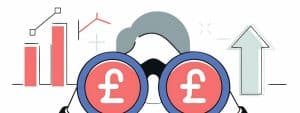TAX ON PENSION INCOME

While pensions enjoy tax-free growth and advantageous tax breaks on contributions, drawing an income from your pension still incurs income tax. However, 25% of the money you take from your pension is tax-free, and you pay income tax on the remaining 75%.
Every person has a ‘Personal Allowance’ of £12,570, which is tax-free. The 25% tax-free portion of your pension does not count towards this allowance, so the total tax you pay depends on your total income for the year.
TWO WAYS TO TAKE THE 25% TAX-FREE
There are two methods to access your 25% tax-free amount:
- Take It All at Once: If you opt to take the full 25% in one go, you must decide whether to draw an income from the remaining 75% or purchase an annuity. You cannot leave the rest untouched
- Take It in Chunks: Alternatively, you can take the tax-free amount in chunks. In this scenario, 25% of each chunk is tax-free, and the remaining 75% is taxable
Your pension provider will deduct the tax before paying you, similar to how income from an employer is post-tax. This is why pension consolidation is popular—having multiple schemes can lead to incorrect tax payments and complicate administration.
HOW EACH PENSION OPTION IS TAXED
Here’s an overview of the tax you might pay on the money you withdraw from your pension pot:
| Pension Option | What’s Tax-Free | What’s Taxable |
|---|---|---|
| Leave your pot untouched | Your entire pot while it remains untouched | Nothing while your pot remains untouched |
| Guaranteed income (annuity) | 25% of your pot before purchasing an annuity | Income from the annuity |
| Adjustable income | 25% of your pot before investing in adjustable income | Income received from your investment |
| Take cash in chunks | 25% of each amount you withdraw | 75% of each amount you withdraw |
| Take your whole pot in one go | 25% of your entire pot | 75% of your entire pot |
| Mix your options | Varies based on the options you choose | Varies based on the options you choose |
TAX EFFICIENT DRAWDOWNS
Drawing from your pension in a tax-efficient manner is crucial. Careful planning based on your actual needs can help reduce your tax bill. As you approach retirement, seeking professional advice can ensure you are well-prepared and positioned to maximise your pension benefits.


RETIRING OVERSEAS
Pension planning becomes more complex if you retire abroad. Expats must understand the double taxation agreements between the UK and their new country of residence, which dictate where and how much tax must be paid.
PCLS payments are taxable in most countries outside the UK, so it is essential to seek advice on how your pension will be taxed in your new location to understand and potentially reduce your tax liabilities.
ADDITIONAL TAX CONSIDERATIONS
UK expats may still be liable for UK inheritance tax on worldwide assets, not just those based in the UK. It's a common misconception that only UK assets are subject to UK IHT.
Capital Gains Tax is levied on the profit made from selling or gifting assets. Understanding how CGT applies to your investments can help manage your overall tax burden.
Knowing the agreements between your asset locations and your country of residence is essential, especially for those retiring abroad with UK pensions. These agreements can influence where and how much tax you need to pay.
Given the complexities of tax regulations, it is always advisable to seek professional advice before making any decisions regarding your pension income and tax obligations.



